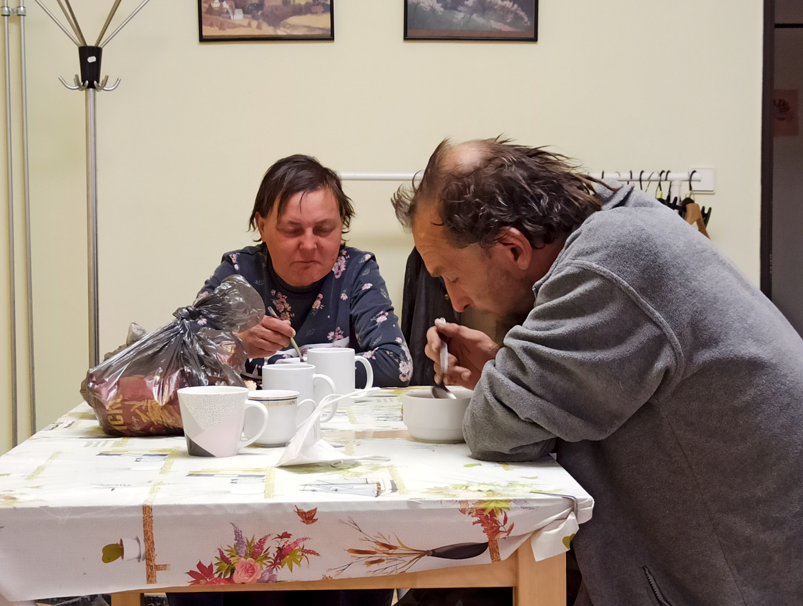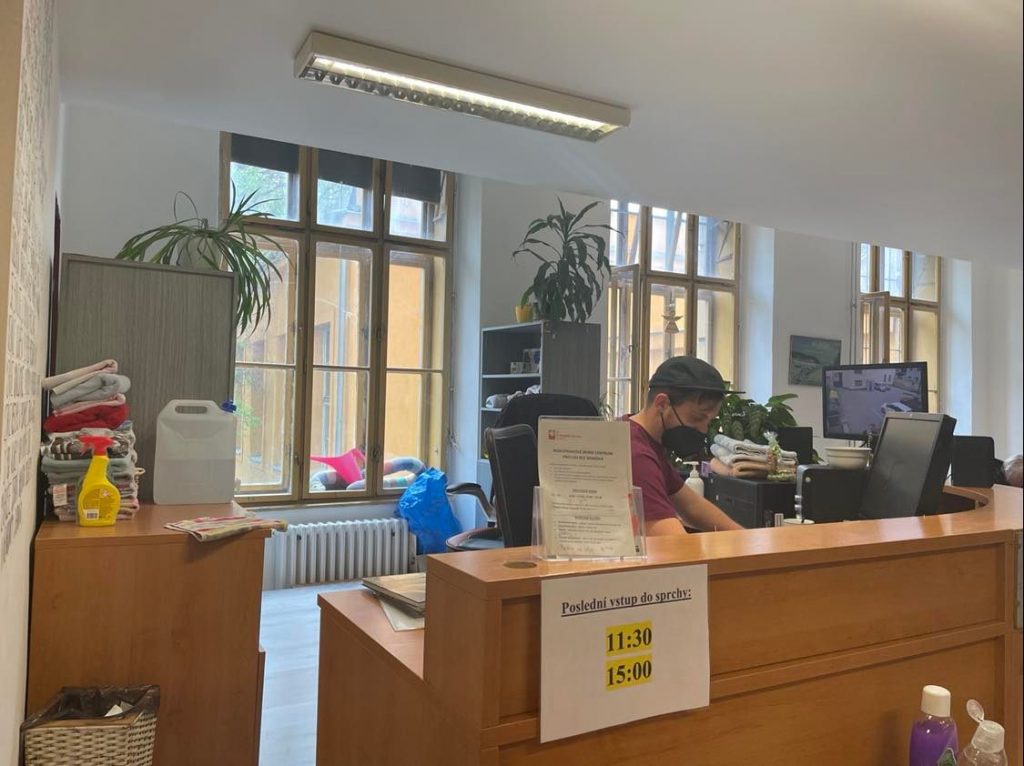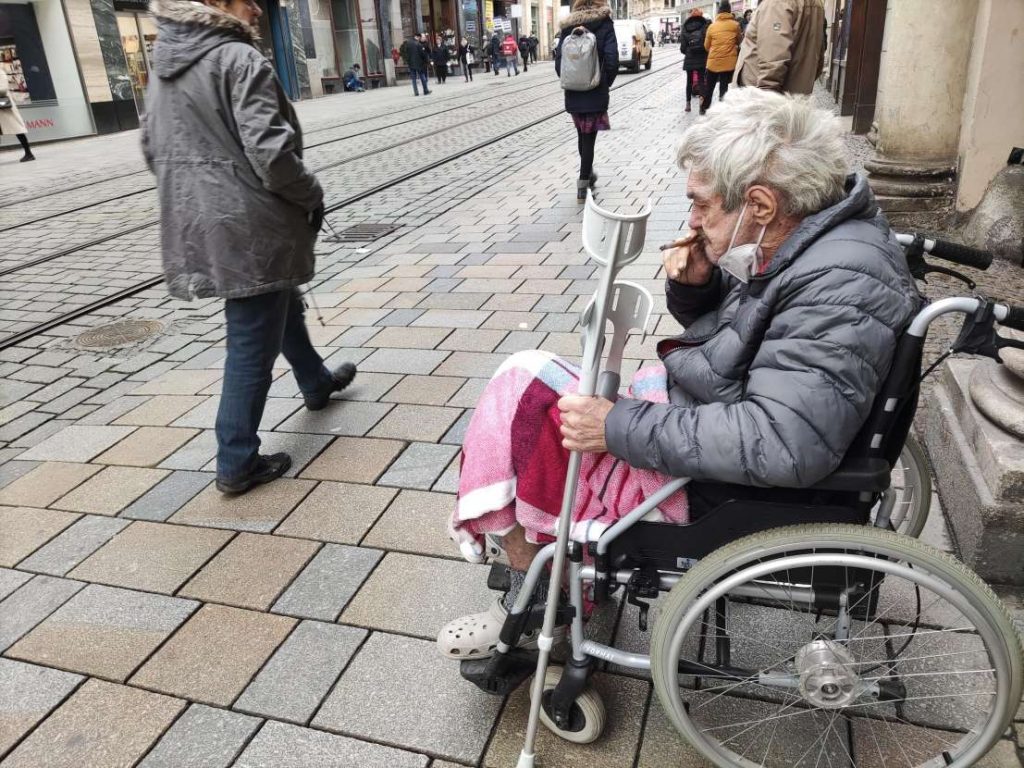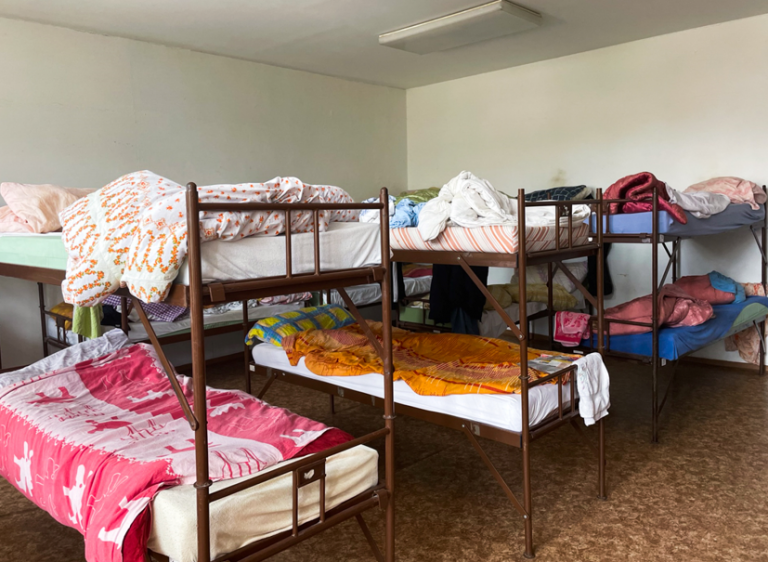Since our last visit in 2019, the shelter for homeless people at Bratislavska 58 has undergone many changes and improvements. After two years of a harsh pandemic, we were able to go there to speak to Zuzana Csontosova, currently responsible for the centre and the team of social workers. She took us around the several shelter services, introduced us to her team and the beneficiaries, and explained the situation of homeless people in Brno. This article is the first in a short series on the functioning of the shelter, its staff and its beneficiaries. Today, we will start with the ground floor of the shelter, where the most important job of welcoming the residents takes place. Photo Credit: Lou K. / Brno Daily
An Old Building
Before our meeting, Zuzana warned us about the building: “we are at Bratislavka 58, the ugly old building behind the nice new one. You need to come into the inner yard and then just go forward.” The building does indeed seem really old from the outside, contrasting with its quite modern interior, equipped to receive the public in the best conditions. In the nice new building in front, another service from Charita Ceska Republika is located, dedicated to asylum seekers. This is where Zuzana met me, used to visitors missing the real address. With enthusiasm, she started the visit from the ground floor, and introduced me to her colleagues.
A First Mission: To Host The Homeless People
The homeless shelter cares for about 80 people per day and about a hundred people in cold weather, from 8am to 4pm. People are usually looking for somewhere warm to go, especially during the winter period, when a special long-term reception facility is set up. But they also come for free meals. Since 2 January 2019, the Czech Constitutional court has ruled in favour of charitable donation. For instance, stores and schools are mandated to donate their unsold or unused food to food banks in the country. That is how the Brno shelter for homeless people is able to provide hot and cold food to its clients all through the year.

Clients of the shelter eat together in the common room. There is hot water, warm food, microwaves and a fridge to provide hearty meals to homeless people. It is also an opportunity for them to discuss their issues with social workers and each other. Photo Credit: Zuzana Csontosova
The team of social workers also provides assistance in medical care, such as contacting doctors. Indeed, Zuzana explained that it was quite common for homeless people in very bad health to be turned away from hospitals in Brno, because of their appearance or drunk state. Moreover, people also come to the shelter for help reaching their family. Most of them don’t have any cellphone, or contact details for their family.
The social workers then try to get in touch with family members, by phone or by exchange of letters. Zuzana took us around the shelter: “Here is the reception, if anyone comes they come here and say their name and what services they need. We provide food, showers and clothes. These are actually second-hand clothes. That is something that people don’t really know. They can bring clothes here because we are collecting them. We have about a hundred people coming here (not always the same people) and they need clothes. It is very hard to collect. We also offer washing for free and it is very important for them”.

The reception office where anyone who comes and needs services can ask for help. Photo Credit: Lou K. / Brno Daily
A Second Mission: To Help People Who Have Sometimes Never Experienced Normal Life
Zuzana and her colleagues also endeavour to help their clients to find jobs and housing, or more generally a stable situation, when they ask for it. However, this can be a difficult task in view of the clients’ painful pasts, as well as the psychiatric problems of the majority of the homeless clients.
“They might have spent 10 or 20 years on the street,” explained Zuzana. “Some of them have never experienced normal life. We also tried to support them but it is much harder to motivate them because they are sort of used to it. Most of our clients have psychiatric illnesses, and those are going to continue. If they lived in a very strong family, it would be easier in society. But nearly all the family backgrounds of our clients are bad, and they didn’t get any support from the beginning. And they may not know about their condition, which is why some of the clients remain mentally ill. Probably they would be sent to some institution. People imagine that homeless people are just the ones they see on the main station, very aggressive, and also they are, but it is a minority. They do also come to us and we try to help them but they are just a very small part of the total number. A lot of the homeless people are not aggressive but they are just victims.There are a lot of people who are disabled. Some of them cannot read, cannot write, and are very naive. Sometimes they get some money because of their illness and get robbed by the others… I would like to tell the readers that yes, I understand that someone can be against this because these are the drunk aggressive people, but also these people have a very bad past and they didn’t have the support every human being should have. However, there are a lot of people hidden: people in wheelchairs, with mental disorders, and we try to help them also”.

“There are a lot of people hidden: people in wheelchairs, with mental disorders, and we try to help them also” Photo Credit: Zuzana Csontosova
More Homeless Men Than Women
As a social worker, Zuzana is in direct contact with homeless people and can therefore analyse the composition of the population she is dealing with everyday. According to her, most of the homeless people in Brno are men, which corresponds to the state of homelessness in the Czech Republic where about 70% are men. “Most of them are men, maybe 80 or 85 %. I think the reason is that for women it is very dangerous to live on the street because of threats, abuse… They tried anything to get off the street. And also they are more responsible in general. I don’t want to use a cliché but most of the time it is like this. So most of them are men and maybe half of them are originally from Brno”.
An Emergency Shelter During The Winter Period
The last room of the ground floor is the night crisis centre. On a beautiful warm spring afternoon, this room was not at peak use. But Zuzana explained that during winter, the room is full of men and women seeking modest comfort, shelter from the freezing cold.

The night crisis centre is open during the winter period from December to February. Photo Credit: Lou K. / Brno Daily
“It is all very modest but that is the way it is. During winter from December to February, this room is the night crisis centre. It is for people not only to not freeze outside but also for people who got a little bit drunk because they cannot keep themselves without alcohol. Some of them don’t have any money, don’t have any place to go, so they could die outside. It doesn’t look like this in winter, we use the bed for the asylum house upstairs. It is free so people can sleep here on the floor, men and women. Again it is a very very basic support. But I think it is good for us as social workers because when there are not enough places in the asylum upstairs, I don’t have to tell the person that they have to go outside. Even if we don’t have anything, at least we have this room even if it is very basic.”






